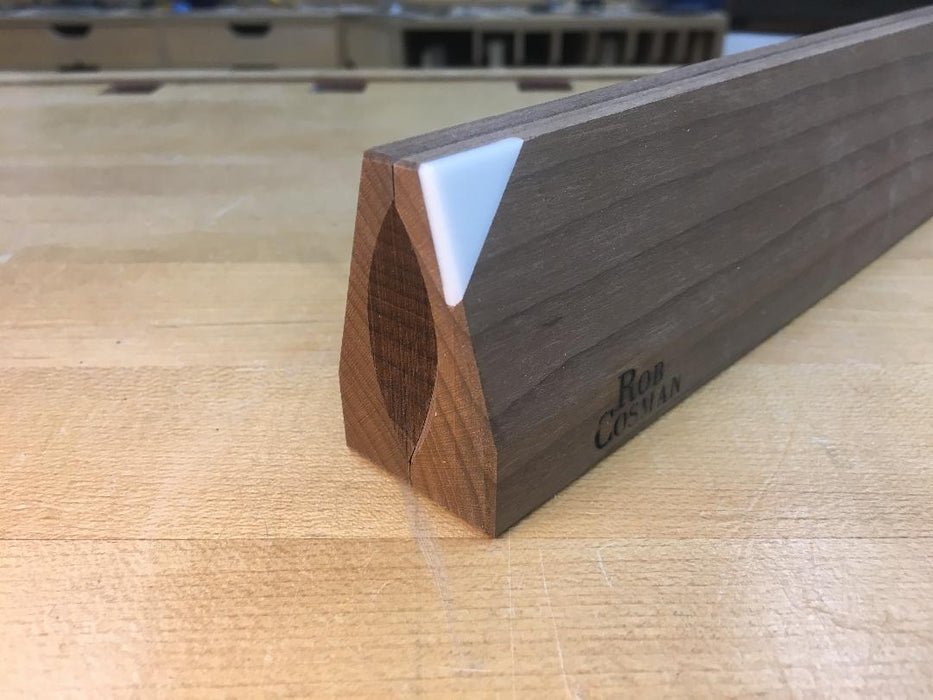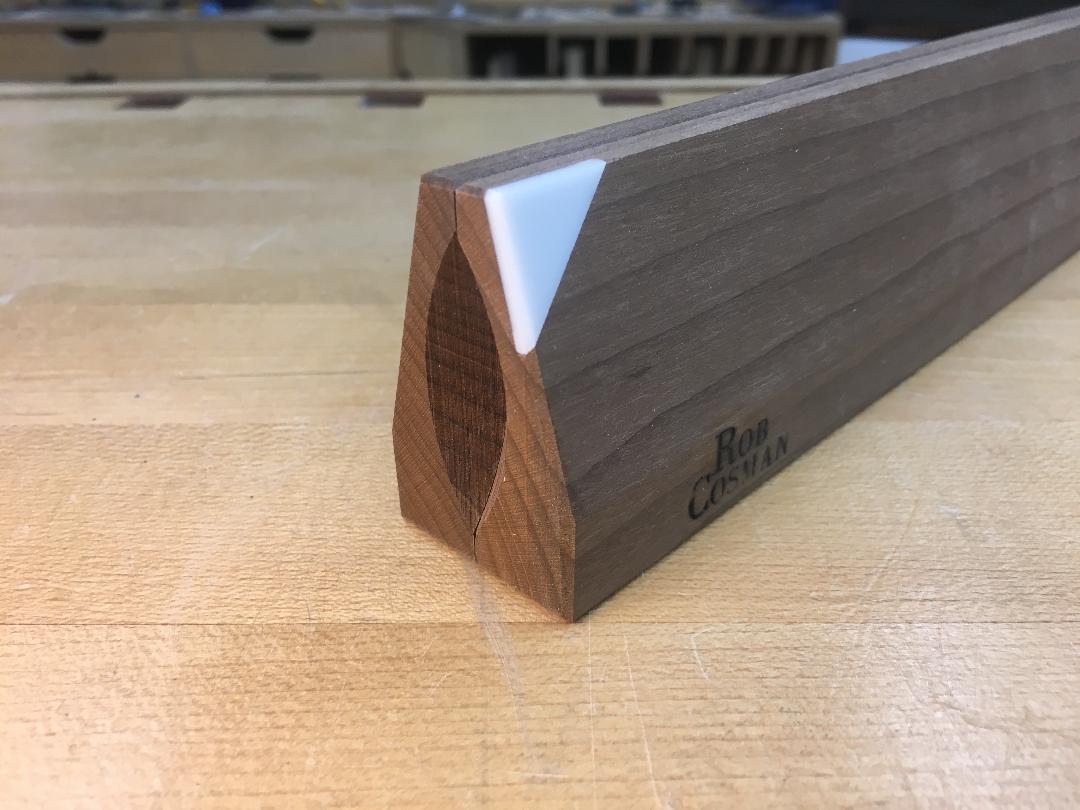

Gallery
Full Description
Customer Reviews
Winding sticks are a time honored jig that helps you evaluate if the surface of a board has any wind or twist. To give you an accurate reading the winding sticks must be precisely made. Here are why my winding sticks give you the professional results you demand:
-
Made from extremely stable, torrefied wood.
-
Torrefied wood has undergone a high-heat treatment changing the cellular make-up of the wood so that the wood does not react to moisture.
-
Precisely milled flat, square, and parallel to give accurate measurements.
-
The sticks are tapered narrow top and a wide bottom to increase stability when upright.
-
2" Tall x 20" Long x 5/8" Wide at the base.
-
Inlaid with a white wood, American Holly, in the corners and centers for easy and accurate readings.
-
Pins mate the sticks together for storage.
Torrefied Wood
From Robs February 2018 Newsletter......
Several years ago, I was given some torrefied maple to test. I hadn't heard of it before and the lumber dealer treated it as something new and wanted me to "check it out". I can’t remember what I made but I do remember it broke in two, and that ended my fascination with Torrefied wood. A couple of years later Arnold London, my longtime birdseye maple supplier, convinced me to try the stuff again. He verified my suspicion that the process of torrefaction does tend to weaken the wood somewhat, worse so if improperly done. However, he had some beautiful Birdseye Maple from a company he assured me had “properly” torrified the wood and that I would love it. This time my experience was better, and the saw handle I made from the stuff turned out beautiful.
Arnold has since closed his business and now I buy most of my torrefied wood from my good friend Mel, who owns Exotic Hardwoods in Burlington, Ontario about an hour west of Toronto. Mel explained the process of torrefaction to me like this, “The best I can tell you is the wood is held in an oven at a temperature that would burn it if not for the absence of the oxygen. There seems to be some tweaking involving reintroducing moisture at some phase before the wood is done!” This heat process darkens the wood slightly. I liken the torrefied birdseye maple that Mel gave me to a piece of maple pulled from a river bottom after centuries of submersion. It has this incredible warm honey colored patina, almost a
glow. I asked Mel just how stable the process makes the wood? Had he ever ripped a board and had it close on the blade? He said, “NEVER!” Wow, this I had to see for myself.
I have since learned a bit more about the process of torrefcation. Torrefaction is not a new process. In the 8th century the Vikings torrefied the wood they used to build their ships, enhancing its stability and durability. Scandinavian countries have been improving this age-old procedure since the 1930s.
The wood is gradually pre-heated in a conventional kiln lowering the moisture content to between 6% and 10%. After that the wood is heated at a very high temperature (between 190C to 240C), in a torrefaction kiln (autoclave) under pressure and in a low oxygen atmosphere (to prevent combustion), lowering the moisture content to almost 0%. The length of the process, as well as the temperature degree sustained, depends on the species and the desired color of the wood. Finally, the wood is placed in a conditioning chamber where the temperature is gradually lowered by controlled steam injection and the moisture level of the product is increased to between 3% and 6%, giving back the wood’s natural flexibility.
This torrefcation process cooks off all the volatile elements in the wood (sugar, oils, and water) leaving behind a mineral residue and changing the wood’s molecular structure from open to closed celled. This has three significant results important to woodworkers: It gives the wood a rich amber color, stabilizes the wood, and significantly improves it’s durability (resistance to rot).
Apparently when properly torrefied, the wood will not absorb water even when submerged for extended periods of time! It is this property that makes torrefied wood incredibly stable. Normally wood moves due to the absorption and release of moisture from the atmosphere as the seasons change. All woodworkers understand this and account for wood movement in their designs. Torrefied wood changes this age-old requirement. To find a “real wood" that stays true was hard for me to believe.
I just completed making some winding sticks from torrefied maple. Prior to using torrefied wood, I would search through piles of lumber looking for boards that were close to quarter-sawn and as straight as possible. I would rough them out, sticker and let them season for 6 months, then resurface the wood and discard anything I deemed unstable. Even after all this effort the wood is prone to move over time.
On Wednesday I finished my first batch of 8 pairs of winding sticks without going through my old process and there is not a wonky stick among the pile! I even ripped an 1/8" slice off the side of a 20” X 6" X 7/8" board and it comes off flat and stays flat - amazing! I plan to make the beam of my panel gauges with this stuff; no more binding.
I have now worked torrefied ash, birch, and maple; you need to try it. It has slight limitations but in the appropriate application, this stuff could prove to be a game changer. Wood movement has always been a source of frustration for woodworkers and cross-grain construction is a recipe for impending disaster. We have all seen cracked table tops from restricted movement between the stable frame and the ever-changing solid top.
And there is more good news! The price of torrefied wood is very moderate. I think one of the great benefits torrefication provides wood processors is the ability to salvage low grade lumber. Excess sap wood in a board usually drops the grade, as do mineral stains and other discolorations. Torrefing wood makes these types of color changes far less noticeable.
I have never been one to stain wood, favoring to use a dark species instead. A big drawback to using stained wood is that the color is only on the surface; sand thru when smoothing between top coats and you reveal the light wood under the stain. By contrast, the torrefied coloring effect is present throughout the entire thickness of the wood.
The more I think about it the more uses come to mind. Great cutting boards that are impervious to water damage, stable tops on chests and tables, drawers that don’t stick. The possibilities abound. My small wood-hinge boxes have always been limited in width because of the movement of the top. I like to have my lid close between the two sides of the box. When closed, the front edge of the top is flush with the front edge of the box and any discrepancy because of wood movement becomes very noticeable. I can’t wait to make a larger box using a solid torrefied birdseye maple top; no cup, no shrinkage, and it lays flat - hallelujah!
Torrefied maple surfaced with a sharp hand plane is like glass and velvet combined - so smooth it feels soft. Get your head around that one! The smell from the shavings reminds me of slightly burnt maple syrup, delicious! It also takes an oil finish well. I typically use 4 or 5 coats of my favorite tung oil, Circa 1850.
The only drawback of torrefied wood seems to be its decrease in shear strength, so I would not recommend it for something like chair spindles. In medium to large construction I would also hesitate to use it.
Enjoy this new-found treasure, I think you will like it as much as I do. Just look at this gorgeous saw handle I just made from torrefied birdseye maple.
- Rob Cosman













